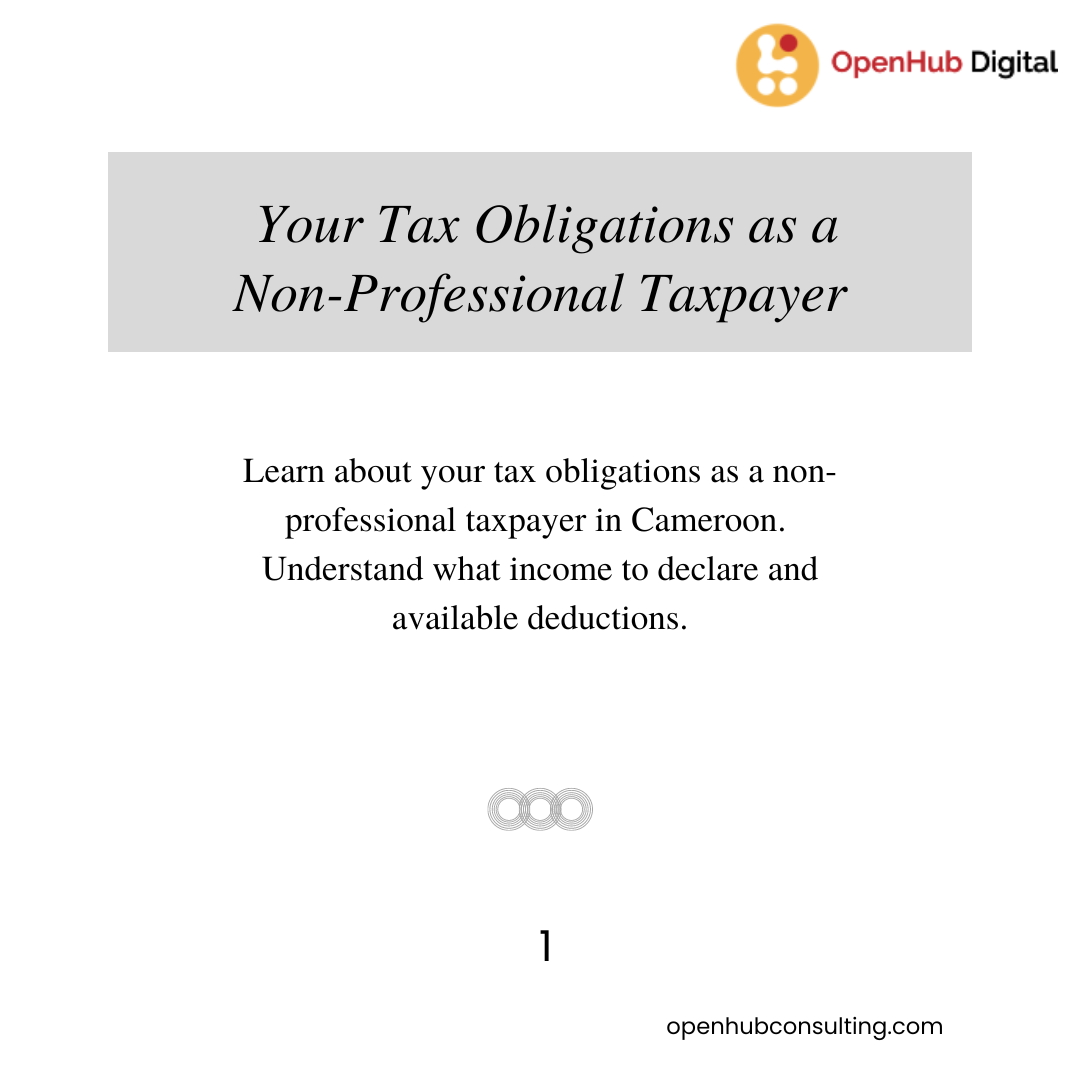In our last post, we introduced our series on tax return filing for non-professional taxpayers in Cameroon. Now, let’s get into the details of what you need to declare for your tax obligations.
What Are Tax Obligations?
Tax obligations refer to the responsibilities you have in declaring and paying taxes based on your income. As a non-professional taxpayer, it’s essential to know what types of income you need to report. According to Section 24 of the general tax code, you must declare various categories of income.
Categories of Income
Here’s a breakdown of the types of income you need to report:
If this article helped you, you can support our work at OpenHub.
Support OpenHub Digital- Salaries and Wages: Any money you earn from employment. This includes your basic salary, bonuses, and any allowances you receive.
- Pensions and Life Annuities: Payments from pension plans and life insurance annuities.
- Income from Stocks and Shares: Dividends and profits from stocks and shares. For instance, if you own shares in a company and receive dividend payments, this income must be declared.
- Income from Real Estate: Earnings from renting out properties. This includes residential, commercial, and any other type of real estate rental income.
- Profits from Handicraft, Industrial, and Commercial Activities: Income from personal business activities. If you run a small business or engage in any form of commercial enterprise, the profits are taxable.
- Profits from Farming Business: Earnings from agricultural activities, including crop production and livestock farming.
- Profits from Non-Commercial and Related Professions: This includes income from freelance or consultancy work, and other non-commercial professions.
Keeping Records
Maintaining accurate records of all these income sources is crucial. Ensure you have documentation such as pay slips, rental agreements, and business records, as these will support your declarations.
Example
Let’s take an example to make this clearer:
Suppose you have a salary of XAF3,000,000 annually. In addition, you receive XAF500,000 from renting out a property and XAF200,000 from dividends on stocks. Your total income for the year is XAF3,700,000. Each of these income sources must be reported on your tax return.
Deductions
While you report these incomes, you can also claim deductions to reduce your taxable income. Common deductions include personal allowances and certain expenses, such as medical costs or educational fees. We’ll cover deductions in more detail in a later post.
Disclaimer
This content is for informational purposes only and should not be taken as tax advice. For personalized assistance, consult a tax professional.
Next Steps
In our next post, we’ll guide you through using the impots.cm portal to file your returns online. It’s simpler than you might think!
For professional assistance in company registration, tax declaration, and more, visit OpenHub Consulting. They help start, run, and grow businesses in Cameroon with services like sales and marketing, bookkeeping, and accounting for small businesses.
Feel free to ask questions in the comments or refer back to our introductory post here for a refresher.
Previous Post: Introducing the New Tax Returns Filing Series for Non-Professional Taxpayers
Next Post: Who Needs to Pay Personal Income Tax in Cameroon?
From Insight to Implementation
Going through the administrative and legal landscape in Cameroon requires more than just information—it requires a grounded local partner. At OpenHub Consulting, we specialize in helping the diaspora and international investors turn their business visions into compliant, operational realities.
If you are ready to move forward, our team is prepared to manage your registration and compliance from start to finish.
Start Your Company Incorporation →Discover more from OpenHub Digital
Subscribe to get the latest posts sent to your email.


One thought on “Your Tax Obligations as a Non-Professional Taxpayer”
Comments are closed.